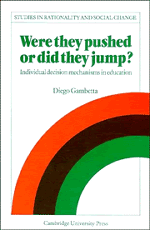Book contents
- Frontmatter
- Contents
- Preface
- List of figures
- Introduction
- 1 THE THEORETICAL QUESTION
- 2 INSTITUTIONAL CONSTRAINTS AND EDUCATIONAL CHOICES
- 3 WERE THEY PUSHED?
- 4 OR DID THEY JUMP?
- Conclusions
- Appendix 1 The high school pupils survey
- Appendix 2 The youth unemployment survey
- Appendix 3 Independent variables
- Appendix 4 Logit models: summary tables
- References
- Index of names
- Frontmatter
- Contents
- Preface
- List of figures
- Introduction
- 1 THE THEORETICAL QUESTION
- 2 INSTITUTIONAL CONSTRAINTS AND EDUCATIONAL CHOICES
- 3 WERE THEY PUSHED?
- 4 OR DID THEY JUMP?
- Conclusions
- Appendix 1 The high school pupils survey
- Appendix 2 The youth unemployment survey
- Appendix 3 Independent variables
- Appendix 4 Logit models: summary tables
- References
- Index of names
Summary
Individual decisions in education are what this book is about. I shall be focusing on the mechanisms that govern individuals’ choices at and beyond school-leaving age and trying to explain why some pupils leave while others stay on, and what it is that make the latter choose one type of school rather than another. The empirical material is drawn from two surveys carried out in North-West Italy, but as far as the substantive implications of this study are concerned – and with the obvious exception of the institutional arrangements of the educational system specific to that country (chapter 2) – it could have come from anywhere else in the Western world. The relevant educational decisions – to stay on in education or leave – are common to most educational systems, and the conditions under which these decisions are made, such as inequality of cultural and economic resources and problems of employment are broadly similar in many Western countries.
There is little need to remind the reader of the crucial effects of educational behaviour from both an individual and a social viewpoint. Sociologists (Hyman, Wright & Reed 1975) and economists (Juster 1975) have explored the wide range of consequences that follow from education, from private and social monetary returns to child-rearing practices, from saving behaviour to occupational destinations. The interest of educational choices, however, lies not merely in their longterm effects, but also in some of their inherent features, which make them both individually non-trivial and socially complex events. Like few other decisions in life, they are encountered by virtually everyone living in Western societies.
- Type
- Chapter
- Information
- Were They Pushed or Did They Jump?Individual Decision Mechanisms in Education, pp. 1 - 6Publisher: Cambridge University PressPrint publication year: 1987

